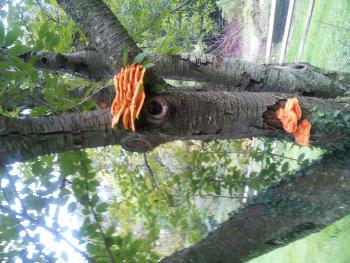Serendip is an independent site partnering with faculty at multiple colleges and universities around the world. Happy exploring!

The Garden 3
It has rained and the garden is very wet. There are no crows. The only sound is a damp thickness of cricket sound, thick as an invisible soup through which my ears have to wade. As I become accustomed and tuned in to them, I hear they are not just an undifferentiated "them", but a symphonic multitude, a chorus of legions of crickets under blade and under leaf, under bush, and under tree. I will search and perhaps find none. I have searched before. Their communication ( I believe that we can make that assumption) has a comforting effect on my nervous system. Theirs is a soft blanketing sound, an unobtrusive blend with the soft swish of leaves in a soundless breeze. We hear the air’s effects. The effect of its movement on surrounding things. Everything is connected. Everything has an affect on something, or someone else.
I have heard myself claim to myself that if a garden sound is not beautiful, in the sense to which I have become accustomed by small song birds, then I would prefer it to be unobtrusive. That is to say banished.
Do I prefer unobtrusive people? Unobtrusive plants?

Site Changes



 To begin with, I was so busy emailing the photos to my email so I could upload them, that I thought my assignment was done. I didn't realize that I didn't actually post anything until after my job at the library, I apologize for being late :(
To begin with, I was so busy emailing the photos to my email so I could upload them, that I thought my assignment was done. I didn't realize that I didn't actually post anything until after my job at the library, I apologize for being late :(
Changes! So many! I dedicated today's observation to seeking out any changes occurring in the area. I could see from very far away that there was an orange growth on the tree I sit under. It was so bright orange, I thought maybe it was the foam that is put to block out and exterminate bee hives. As I got closer, I thought someone might have left a handkerchief tied on the branches. Then I saw this:

Here's the article
...that HSBurke referenced in class today, as we were discussing what to "do" with stories of trauma:
Zimbabwe teen leaves anguish behind, starts future at Bryn Mawr (Philadelphia Inquirer, Oct. 2, 2012)

Article
Hey guys,
Here's the article I was talking about in class today (or rather a link to it from Bryn Mawr's website):
Something about it just rubs me the wrong way. People (even JMac!) are speaking about her with such authority, like they know her so deeply. And it's been, what? a month? I think her story's incredibly brave, but I think what I was trying to get at today is that: as a student body, do our perceptions/treatment of her change thanks to this new knowledge? What do we do with her story?

Rhoads Pond Impressionism
So I am not the best artist in the world, as evidenced by this watercolor. However, I really wanted to use the tools Nan put at my disposal. I found, though, that the brush was not the right instrument for me. I ended up using my fingers to create this. It made me feel much more connected to the paper, and was much eaasier to mix the colors I needed.
I also decided to paint ontop of a page of Gary Snyder's essay. I loved his garden metaphor for good writing, and wanted to incorporate it somehow. I tried painting on just a regular piece of paper, but decided it didn't quite caputer our class notions of language and reprsentation. I'm not quite sure how it connects, seeing as I was painting and not writing, but I like the way it turned out.

needs?
The section of Offending Women made me really angry. I had been angered before at some of the problematic aspects of both the programs that the author was assessing but this chapter struck me as particularly problematic. Many of the practices that were to get women to “open up” seemed almost like some kind of psychological torture, forcing the inmates into hysteria without any real way to build them back up. I was disturbed by the way in which the social aspects of their traumas/stories were ignored to draw focus on the ways in which their “addictive” personalities led to them being imprisoned… It seemed almost violent to the minds and hearts of these women to force them to relive their stories and then place the blame entirely on them for their situation. I was also really angry when Haney was describing the search through the women’s belongings. There was a complete lack of boundaries and privacy, both of which I think people are entitled to. Especially when they went through the women’s things and threw out what the institution had decided were not “necessities.” One of the women had saved up shampoos and toiletries for when she leaves; probably knowing full well what its like not to have money and no access to those things. The staff member cleaning out her room laughed. She laughed, without even bothering to address why that inmate would’ve felt that she needed to stock up on toiletries in the first place.

One woman's freedom is another woman's imprisonment
The description of the Visions community in chapter 5 is reminding me in ways of the Delpit article because it displays the ways in which a liberal, middle class, white agenda about personal growth and well-being can actually be incredibly harmful due to the ways it clashes with the realities of systematic oppression. The ways that the staff people thought of themselves as “liberating” the women, by telling them they couldn’t wear makeup or sexually revealing clothing, when in fact, that is one perception of freedom oppressing these women’s ability to control the external expression of their identities.
This also makes me think about intentional communities in general -- and when and why they work and fail. This seems to produce evidence that, if an intentional community is established, and you bring in and subject others to the intentions of that community who are not devoted to the ideals, but rather are prisoners of those ideals, it becomes another form of incarceration, even if it’s more “humane” according to middle class standards.
“I looked at her and realized that she wasn’t the same woman who entered [Visions] a year ago. This time she couldn’t make it but maybe next time she will… My job is to make the women aware of their psychological pain. She’s aware of it now. So in some way, it was a kind of victory” (176).

Unveiling Prison Employees Too!
When I heard that the Warden was not coming to our class, I was extremely disappointed. Much like the invisibility of prisoners, I feel like the people who work within the system are also invisible. Although I wasn't expecting hirer to share a personal anecdote from her life beyond the prison walls, I did want to see a face and notice the impact it would have on me. When discussing "female offenders" in class, I sometimes forget that the people who must "deal" with them are prisoners as well--they are confined to watching the inmates, confined to possible, and justifiable, fear for their lives every day at work, and, like Tamika from Visions, confined to being an emotionless being. Although Haney gives voice and insight into the lives of the Vision workers, only on the job of course, I also see that even with visibility, Haney was able to capture reservation from the workers. For instance, Tamika did not believe in being emotional while Margaret distanced herself by taking advantage of the power she had over her employees. So it seems that the issue is two-fold: prison employees are invisible from society but at the same time choose invisibility. I wonder if I would have sensed this with the warden and what kind of questions would have come up as a result. Like we do with the inmates we read about, I would like to have a conversation about the ethnic/racial/class make-up of the employees.

4Oct2012Vision4: Desire-based research and Vision's addiction concept
A couple of classes ago, we discussed the complications with making research based in desire. While we thought that desire-based was more beneficial/was the extra layer that damage-based research needed, using the diction choice of "desire" disturbed us a little bit. In other words, what Eve Tuck was trying to advocate (a more holistic approach to research, and not concentrating on only what wrong has been imposed onto a group) may not be best encompassed by the word desire, since it associates persons as always "wanting" something or addicted to something.
Visions, then, seems to be the end product of what worried us so much. By solely using the rhetoric of "desire" and "addictions" to address what problems the women may have, it seems to limit and test them in ways that could turn out to be more damaging than fruitful. Admittedly, I haven't read through the book yet, so I can't make a stance on how Haney sees this plays out, but so far, Visions and its practice of trying to channel desires to other "healthy" avenues seems to be awful in its own way. To have the women always in a space of complete transparency, allowing them to speak whatever they might to a peer in the hotseat--it's pretty brutal. I may be making connections that might not make sense in those post, but I'm worried.
To always think about people in terms of desire is not good.

Required to speak
I light of our recent Silence (and Serendip) conversations about getting to know each other better, I was interested in the expectations that were put upon the Visions women to "share" during group therapy sessions. Haney notes that the aim of these therapy sessions was "to push one another to divulge and reflect [...] quite specific things". I was so troubled by the notion that these women were required by the rules of the facility to share specific parts of their life -- they even didn't get to choose the proper time or avenue. As I mentioned in my last Silence post, although I desperately want to know more about you all (and props to Chandrea's activity today!) stronger still is my desire for us as a class to feel comfortable or inspired to share. In my opinion, everyone should have the choice to pick silence, especially when it comes to revealing very personal experiences. Unfortunately, due to the structure of the program, women at Visions didn't have that choice. And, in regards to the core goal of the program, I feel like being forced into discovering your voice isn't nearly as "therapeutic" as being given a safe space to find it on your own.


